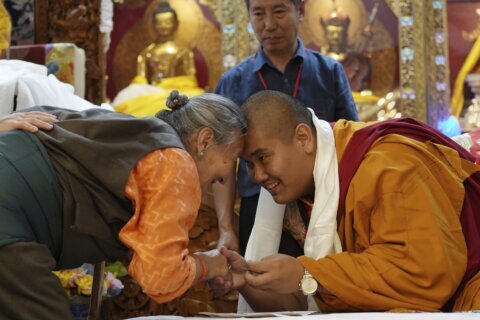NEW YORK (AP) — There’s nothing that can keep Christian Cooper from enjoying his “happy place,” the bird-friendly Ramble of Central Park — not even his tense, viral video encounter three years ago with a woman walking her dog off leash in his refuge.
Cooper is a lifelong birder, and Black, a relative rarity for the pastime. The dog owner is Amy Cooper, who is white and no relation. His video of her pleading with a 911 operator to “send the cops” because, she falsely claimed, an African American man was threatening her life has been viewed more than 45 million times on social media.
Much has happened to each Cooper since.
She was fired by an investment firm and a judge tossed her lawsuit challenging the dismissal. Later, a misdemeanor charge against her was dropped after she completed a program on racial bias.
He scored a memoir, out this week, and has his own series on Nat Geo Wild, traveling the U.S. doing what he loves most: birding. “Extraordinary Birder with Christian Cooper” premieres Saturday.
Something else happened the day the two Coopers clashed. Just hours later, George Floyd was killed under the knee of a white police officer more than 1,000 miles away in Minneapolis. They had no way of knowing that, of course, but Christian Cooper told The Associated Press in a recent interview he had another Black man, Philando Castile, on his mind when he flipped his phone camera to record.
Castile was fatally shot in the Minneapolis area in 2016 by an officer who wrongly thought the 32-year-old was reaching for a gun during a traffic stop. Castile’s girlfriend, Diamond Reynolds, had the presence of mind to hit record on her phone, and her livestream on Facebook touched off protests around the country. (The officer who shot Castile was acquitted by a jury.)
Christian Cooper’s decision to record was personal but routine for birders trying to convince park officials to do something about dogs off leashes where signs clearly prohibited it to protect plantings in The Ramble and leave the birds undisturbed. He was polite but firm as he spoke off-camera while Amy Cooper raged.
“I thought to myself, you know what? They’re going to shoot us dead no matter what we do. And if that’s the case, I’m going out with my dignity intact,” he told the AP.
For a second, he added, “I was like, oh, yeah, when a white woman accuses a Black man, I know what that means. I know what trouble that can mean in my life. Maybe I should just stop recording and maybe this will all go away in a split second. Then I thought, nah, I’m not going to be complicit in my own dehumanization.”
Amy Cooper never apologized directly to him, though she issued a statement of regret. And since then, Christian Cooper has done some soul-searching on what it must be like, at least sometimes, for women to feel unsafe in public outdoor spaces.
“I would hate to think that I would go through a situation like that and not learn something myself. And so I try to keep in mind now that, yes, I’m perfectly comfortable in The Ramble. It’s my happy place. But that’s not necessarily true of everyone,” he said.
Amy Cooper demanded he stop recording, upset when he offered her cocker spaniel, Henry, a dog treat. It’s a tactic controversial among birders frustrated by unleashed dogs in The Ramble. “It’s a very in-your-face move. You know, no bones about that. I haven’t done it since,” he said.
He declined to cooperate with prosecutors in the criminal case against Amy Cooper. It was an election cycle, he said, so it felt performative. But also, he felt, she had been punished enough through public disgrace.
“I decided I kind of have to err on the side of mercy, particularly weighing with that a sense of proportionality because I had not been harmed. I had not been thrown to the ground by the police or, God forbid, worse. I had never even had to interact with the police. I’m sure my opinion would be different if I had,” he said.
Now, Cooper is all about spreading the gospel of birding once again. His book, “Better Living through Birding: Notes from a Black Man in the Natural World,” opens with the Central Park encounter, and then launches into his life:
How birding helped him connect to the world as a closeted gay child in his predominantly white Long Island hometown. How all things Star Trek, science fiction and Marvel Comics have sustained him to this day, at age 60.
“The cure to my outsider status was to go outside, outside of myself, outside of my own head, outside into nature. Because you can’t go looking for birds without really focusing on what you’re doing, and focusing on the natural world around you,” he said.
“And when you do that, you can’t be preoccupied anymore about, ‘Oh my God, I feel so horrible.’”
As a longtime board member of the New York City Audubon Society, Cooper has seen the ranks of Black birders increase, and he has participated in a movement among National Audubon Society chapters to cast off the name of John James Audubon. The 19th-century artist and naturalist known for his paintings of North American bird species was an anti-abolitionist who owned, purchased and sold enslaved people.
Cooper’s chapter of the society is in the process of coming up with a new name, though the parent organization declined to do the same.
With his book, Cooper said, “I hope to reach a whole mass of people who have never really thought about birds or maybe haven’t engaged with nature on that level. If I can communicate some of my passion for birding, for birds, and get them to sort of open their awareness just a little bit more to these creatures around them, because they are spectacular, then the book will have achieved its goal.”
On Nat Geo (the series hits Disney+ on June 21), Cooper serves as host and was a consulting producer. He’s a kid in a wonderful, winged candy shop.
The six episodes have him scaling a Manhattan bridge tagging peregrine falcon chicks, navigating volcanic terrain in Hawaii in search of elusive honeycreepers, and trekking rainforests in Puerto Rico to check on fertility issues among parrots. He also shot in Palm Springs, California, and Washington, D.C., as well as Selma, Alabama, where members of his father’s family once lived.
Cooper has spent time in public schools teaching kids about birding. He wants to reach even more with the fame he earned the hard way.
“I’m hopeful that a lot of young Black kids will see maybe one of the first big birding shows on TV with a black host leading the show and think, ‘Oh, maybe that’s something I can do, too.’ That would be awesome.”
___
Find Leanne Italie on Twitter at http://twitter.com/litalie
Copyright © 2024 The Associated Press. All rights reserved. This material may not be published, broadcast, written or redistributed.







